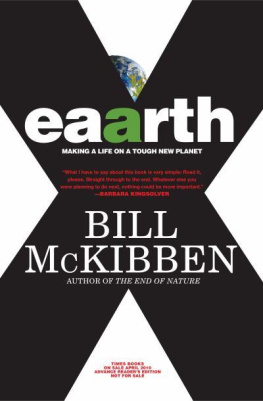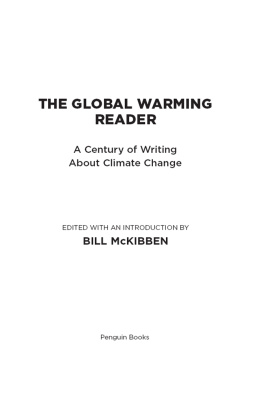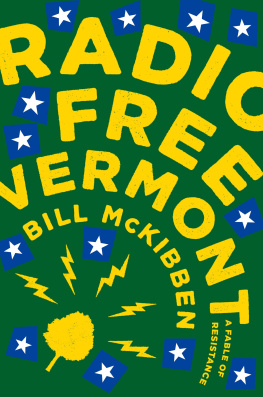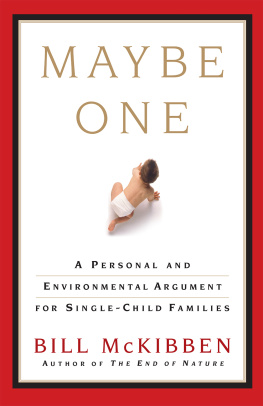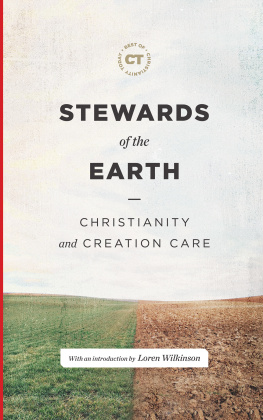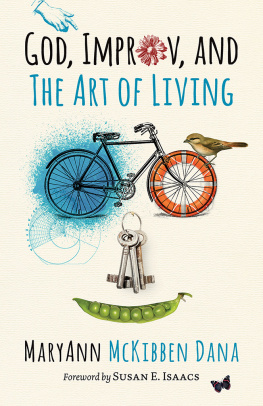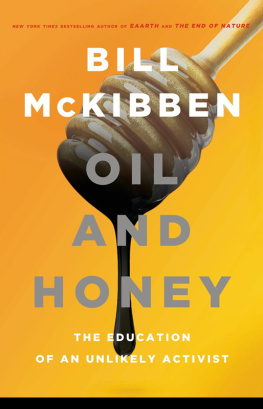COWLEY PUBLICATIONS is a ministry of the brothers of the Society of Saint John the Evangelist, a monastic order in the Episcopal Church. Our mission is to provide books and resources for those seeking spiritual and theological formation. Cowley Publications is committed to developing a new generation of writers and teachers who will encourage people to think and pray in new ways about spirituality, reconciliation, and the future.
The Comforting Whirlwind
The Comforting Whirlwind
God, Job, and the Scale of Creation
Bill McKibben

Copyright 2005 Bill McKibben
All rights reserved.
Published in the United States of America by Cowley Publications, a division of the Society of Saint John the Evangelist. No portion of this book may be reproduced, stored in or introduced into a retrieval system, or transmitted, in any form or by any meansincluding photocopyingwithout the prior written permission of Cowley Publications, except in the case of brief quotations embedded in critical articles and reviews.
Library of Congress Cataloging-in-Publication Data
McKibben, Bill.
The comforting whirlwind : God, Job, and the scale of creation / Bill McKibben.
p. cm.
Includes bibliographical references.
ISBN-10: 1-56101-234-3 ISBN-13: 978-1-56101-234-3
(pbk. : alk. paper)
1. Bible. O.T. JobCriticism, interpretation, etc. I. Title.
BS1415.52.M35 2005
223'.106dc22
2005012075
Quotations from The Book of Job, translated and with an introduction by Stephen Mitchell, copyright 1979 by Stephen Mitchell. Revised edition copyright 1987 by Stephen Mitchell. Reprinted by permission of HarperCollins Publishers.
Cover design: Brad Norr Design
This book was printed in the United States of America on acid-free paper.
Second Printing
Cowley Publications
4 Brattle Street
Cambridge, Massachusetts 02138
800-225-1534 www.cowley.org
For the men, women, and pastors of the
Johnsburg United Methodist Church
Contents
PREFACE
The 2004 presidential election contained, by most accounts, more religion than any campaign in the Republics history. The victorious GOP attributed much of their success to organizing in the suburban megachurches of the swing states; polling showed that many Americans said they were voting their values by supporting the Bush administration. The Republicans have clearly emerged as the party of faith; even now the Democrats are sputtering in an effort to retool so they too can claim the mantle of religion.
But the very same people elected as guardians of moral values show up at the bottom of the list when it comes to protecting the environment: Show me a congressman with a perfect rating from the Christian Coalition and I will bet you he barely registers on the scorecard of the League of Conservation Voters.
I have been puzzled most of my life by this contradiction: How can one believe deeply in God and yet be so cavalier about Gods creation?
I am by training a writer and an environmentalist, and by coincidence a Methodist Sunday school teacher. Im not a professional theologian, nor even really an amateur. But Ive wandered often through the Bible, stopping more and more frequently at the book of Joba book that offers, I think, a radical, deeply biological, intensely exhilarating view of the meaning of our lives.
Job has been read many ways, of course. But like the rest of the Bible its exquisite environmental relevance has been generally overlooked. Now we need those stories. The relationship between people and their environment, which in the largest sense we could always take for granted, has suddenly begun to fray. To fray so badly, in fact, that most of us feel deep down as if our half-hearted responsesour recycling, our compostingare not as radical as the times demand.
The stories from the Biblethe answers from Jobare deeply radical; they will not fit comfortably with our present way of seeing things. Parts of these stories will be equally unpalatable to the left and to the right, and simply maddening to the middle. Still, the crisisboth physical and spiritualin which we find ourselves is so deep that we will soon be turning in every direction for answers. I want to outline one of those possibilities, on the theory that the Bible still has some standing in our societythat an argument for deep change that summons the majesty of the wisdom literature may reach deeper inside us than the next fund-raising appeal for the Audubon Society.
I would like to thank several people for their help with this project. Molly Longstreth, Newell Wert, and especially Len Sweet invited me to give the 1992 Heck Lectures at United Theological Seminary in Dayton. This book was drawn from those lectures, and I am as grateful for their intellectual help as for their hospitality. I am not a lecturer by trade, and I have since revised my remarks extensively, incorporating chunks of both argument and text from my books The End of Nature and The Age of Missing Information, both originally published by Random House. The men and women of the Johnsburg United Methodist Church, and of Troy Conference of the United Methodist Churchin particular Lucy Hathaway, Barb Lemmel, Mitch Hay, Carol Anne Grieg, and Sabine OHarahave been inspirations. I am grateful to Stephen Mitchell for allowing me to quote at length from his splendid translation of the book of Job. Jon Pott has been more than patient waiting for my thoughts to coalesce; Gloria Loomis has been glorious as always; and Sue Halpern, my wife, and Sophie, my daughter, have made me better able to see the wonder of the world around.
CHAPTER
1

Job, as many have remarked before me, is not the story of a patient man. It is the immediately familiar and very modern story of a frustrated man, up against an orthodoxy that he no longer can believe in, but surrounded by a society that continues to insist that its accustomed interpretation is the only truth.
His problem is not only that he suffersit is that he suffers without understanding why. To give the briefest of synopses, the prosperous Job suddenly finds his fortune gone, his children dead, and himself residing on a dung heap at the edge of town where he fills his hours picking at his innumerable scabs and running sores. In Stephen Mitchells marvelous translation, he says:
Each day I live seems endless,
and I suffer through endless nights.
When I lie down, I long for morning;
when I get up, I long for evening;
all day I toss and turn.
My flesh crawls with maggots;
my skin cracks and oozes.
My days fly past me like a shuttle,
and my hope snaps like a thread.
This sorry man had three friendsEliphaz, a Temanite, Bildad, a Shuhite, and Zophar, a Namathite. Hearing of his misfortune, they journeyed to Job so that they could comfort him. And they were good friendswhen they first met him, they cried out, tore their clothes, and sprinkled dust on their heads. They even stayed silent for seven days and seven nights, awed in the face of this great suffering.
Finally, however, they began to talk. Their talk, and Jobs answering soliloquies, fill twenty-nine chapters. It is unlike almost any other story in the Bible, where kingdoms tend to rise and fall in a single paragraph, eras begin and end with great economy, cataclysmic events come and go three and four to a page. Instead, it repeats and backtracks and rehashes chapter after chapter of the same arguments at a higher and higher pitch. It reminds me most of the daily in-and-out of a newspaper op-ed page, where some issue like the death penalty is examined day after day, year after year, till everyone knows all the arguments and has long since made up his or her mind. Bildad and Eliphaz and Zophar are the syndicated columnists of their day, repeating the old truths ad infinitum, though with considerably more literary flair. Their arguments hardly developthey simply repeat the same wisdom of the ages, over and over again. As the liberation theologian Gustavo Gutierrez, who has written a fascinating book titled
Next page

